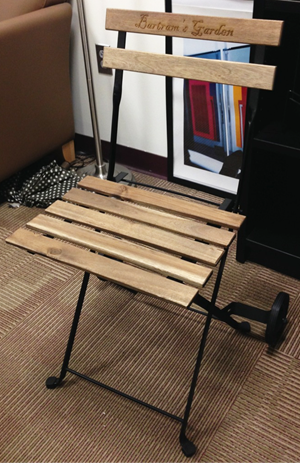
Six Paul Peck Scholars designed, produced and generated a renting system for a special chair to be used at Bartram’s Garden as part of the Engineering Projects In Community Service (EPICS) at Drexel University.
The project, named “Have a Seat,” required the students to create a chair that is lightweight, portable, durable, cost-efficient and consistent with the style of the surroundings of Bartram’s Garden. The chair will allow visitors to easily carry the chair around and sit anywhere in the 46-acre botanical garden.
“The most important thing I learned was how engineering can be beneficial to the community,” Ziyin Huang, a pre-junior in Materials Science and Engineering, said.
It took about six months for the students to research and implement the project, although there were some hurdles at first.
“None of us were Mechanical Engineering [majors],” Akhil Kapoor, a Computer Science major, said. “None of us were extremely comfortable with the idea of building the chair. We were struggling.” The students involved on the team had diverse backgrounds in engineering fields including chemical, materials, computer science, civil, software and electrical, but none in mechanical.
Halima Olapade, a Software Engineering junior, said, “Our original intent was to design and build a custom chair. However, factors such as cost of production and lack of expertise in building chairs led us to the decision to purchase an affordable, commercially available chair. This chair, after purchase, was then customized to fit Bartram’s needs.”

The original foldable chair, purchased from IKEA, was rekindled by attaching two steel wheels to the back legs and coating with water-resistant spray. A tire is mounted directly to each wheel for stability and safety.
This 12-lb easily portable chair is made of a metal frame and wooden bars used for the seat and the back. The total manufacturing cost was about $35 per chair, which was much more cost-efficient than the initial plan.
A personalized twist was added to the aesthetic appeal of the chair. The italic, vintage-inspired text “Bartram’s Garden” was engraved onto the topmost wooden bar of the chair by using a laser cut machine.
Huang enjoyed working with his classmates, “It was such a great experience working and learning with those amazing Paul Peck Scholars. ‘Have a Seat’ also gave me the opportunity to connect with a lot of faculty and staff in the College of Engineering and the Drexel Machine Shop.”
The team has conducted a number of tests on simulation, so their first practical version worked smoothly. They asked people to sit on the chair and dragged it around campus to examine its sturdy quality.
Ivi Kusta, a Civil Engineering senior, said the highlight of their experience was being able to see the excitement on the faces of the people working at Bartram’s Garden.
Alistar Erickson-Ludwig, the faculty advisor of “Have a Seat,” had similar feedback, “[The Bartram’s Garden people] were incredibly impressed by the caliber of the students’ work, and really felt that they could implement this chair in the garden.”
According to Erickson-Ludwig, “Have a Seat” has opened up doors to future collaborations between Drexel EPICS and Bartram’s Garden. Meanwhile, the students expressed interest and engagement in this engineering-integrated community service activity program.
“I spent a lot of time doing community service, but most of the things I did before were not engineering-related. This project shows me that my knowledge in engineering can also help improve the community,” Huang said
“The Bartram’s project is the first community partnership project that I have been involved in, and an important lesson that I’ve learned is about the emphasis on the ‘partnership’ aspect. Through the design and development process, our team gained a deeper understanding of the value of open community establishments such as Bartram’s Garden and the roles that they play in our lives,” said Olapade. “As a result, we also gained a fresh perspective of the problem we were trying to solve, seeing ourselves as the community in need of the solution.”